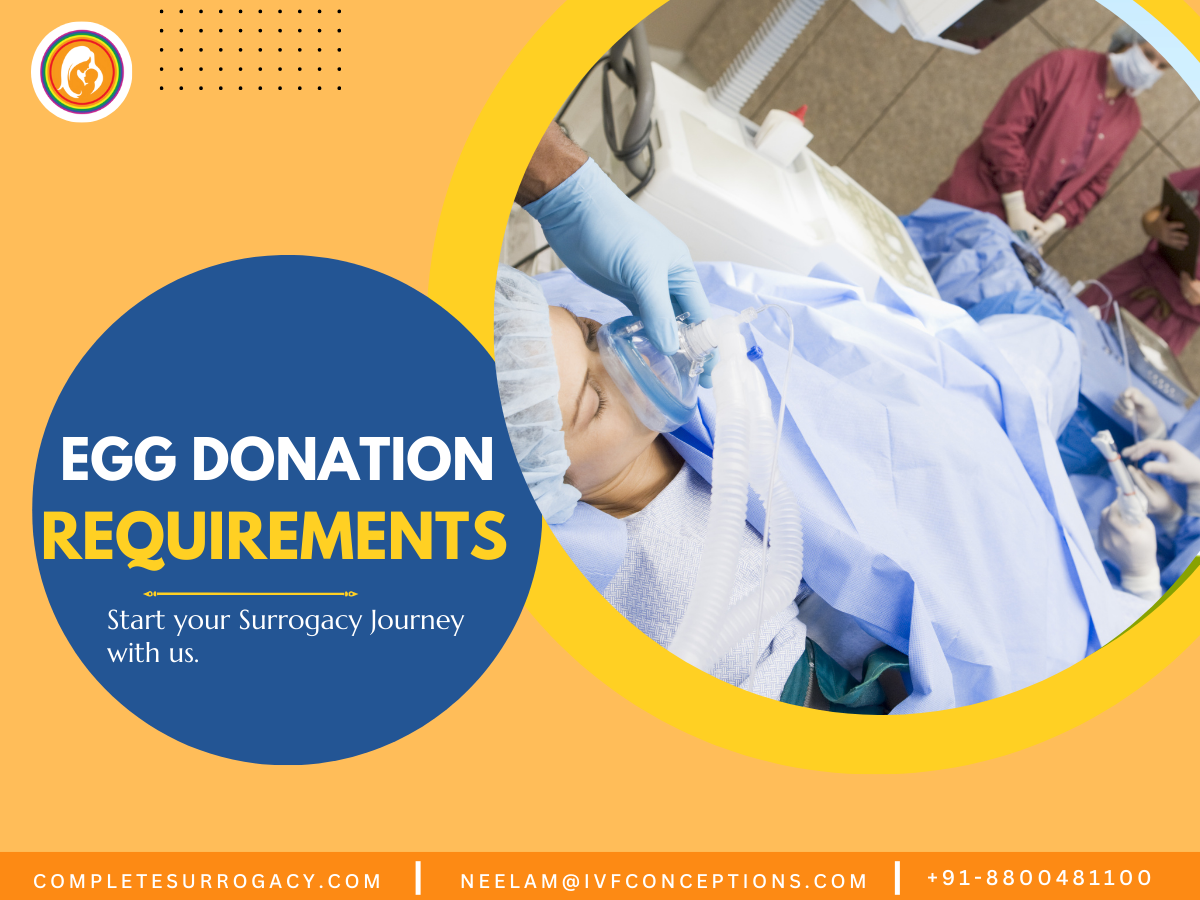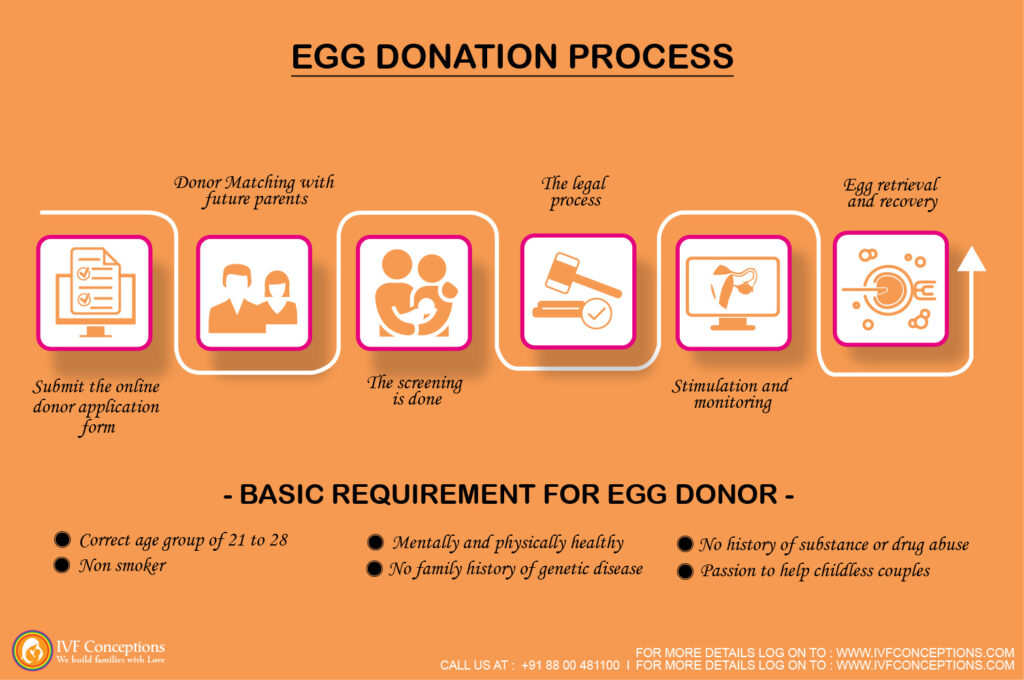Egg Donation Requirements

Egg donation is a profound act of generosity that helps individuals and couples fulfill their dream of parenthood. However, becoming an egg donor involves meeting specific egg donation requirements, undergoing thorough medical screenings, and committing to a structured process.
- Book an online appointment: Get a free online consultation.
- Call\W:+91-8800481100 Email:neelam@ivfconceptions.com
This definitive guide to egg donation requirements provides a detailed overview of the eligibility criteria for egg donors, the step-by-step process, associated costs, and potential risks. Whether you’re considering becoming a donor or an intended parent exploring egg donation programs, understanding these key aspects ensures a well-informed and smooth experience.
What is Egg Donation?
Egg donation involves a woman providing her eggs to help individuals or couples who cannot conceive on their own. This process supports a diverse range of people, including:
- Heterosexual Couples: Struggling with infertility.
- Same-Sex Couples: Requiring donor eggs for conception.
- Single Men: Seeking to become parents.
- Individuals with Medical Conditions: Affecting fertility.
Egg donation is a crucial part of Assisted Reproductive Technology (ART), where donated eggs are fertilized with sperm to create embryos for implantation.
More Resources to Read:
Surrogacy Guide for Surrogate Mothers
Surrogacy Guide for Intended Parents
How does the surrogacy process work
How Long Does the Egg Donation Process Take?
The egg donation process typically spans several weeks and involves the following stages:
| Stage | Description | Duration |
| Initial Assessment & Application | Complete an application to a donor agency, providing personal and health details. | 1 week |
| Screening & Testing | Undergo medical and psychological evaluations to ensure eligibility. | 1-2 weeks |
| Medications & Stimulation | Start medication to stimulate egg production, monitored through blood tests and ultrasounds. | 2 weeks |
| Egg Retrieval | Minor surgical procedure to collect eggs, performed under sedation. | 30 minutes |
| Post-Retrieval Care | Rest and follow-up care to ensure recovery. | 1-2 days |
Who Can Be an Egg Donor?
To qualify as an egg donor, you must meet several criteria:
- Age: Between 19 and 28 years old.
- Health: Good physical and mental health.
- Menstrual Cycle: Regular menstrual periods.
- Lifestyle: Non-smoker and no drug use. Moderate alcohol consumption.
- Psychological Readiness: Understanding and willingness to undergo the process.
The Egg Donation Process: Step-by-Step

1. Application
Fill out an application form with an egg donor agency, providing details about your background and health.
2. Screening and Selection
Undergo medical and psychological evaluations:
| Screening Type | Purpose | Components |
| Medical History Review | Assess health history and identify any potential issues. | Health questionnaires, medical records review |
| Physical Examination | Ensure physical readiness for donation. | Blood tests, ultrasound scans |
| Psychological Evaluation | Confirm mental preparedness and understanding of the process. | Counseling sessions, psychological assessments |
3. Matching with Intended Parents
If selected, you’ll be matched with intended parents, followed by:
- Meeting the Recipients: Depending on the agency, you may meet the intended parents.
- Further Testing: Additional medical tests to confirm compatibility.
4. Medication
Begin a regimen of fertility medications to stimulate egg production. This phase includes:
- Hormonal Injections: To develop multiple eggs.
- Regular Monitoring: Blood tests and ultrasounds to track progress.
5. Egg Retrieval
Under sedation, eggs are collected through a minor surgical procedure:
- Procedure: Performed vaginally with ultrasound guidance.
- Anesthesia: Typically “twilight anesthesia” to keep you relaxed but not fully unconscious.
6. Post-Retrieval
Post-procedure, you’ll need rest and follow-up care, with some mild discomfort expected.
Cost of Egg Donation
Compensation for egg donation varies:
| Factor | Range | Details |
| General Compensation | $5,000 – $10,000 | Average is $8,000 per donation. Factors include donor experience and ethnicity. |
| Regional Differences | Lower in Eastern Europe | Compensation varies significantly by country. |
Egg Donation Requirements
So, what are Egg Donation Requirements?
Becoming an egg donor is a significant commitment that requires meeting specific criteria to ensure the health and safety of both the donor and the recipient.
1. Age
Age Range: 21 to 28 years old
- Why Age Matters: Women within this age range are typically considered to have the healthiest and most viable eggs. Younger donors generally have higher-quality eggs, which increases the chances of successful fertilization and pregnancy.
- Impact of Age on Egg Quality: As women age, the quality and quantity of their eggs naturally decline. Therefore, donors outside this age range may not be considered due to lower success rates.
2. Health
Physical Health: Must be in good physical condition
- Health Assessments: Potential donors undergo comprehensive medical evaluations, including a review of their health history, physical exams, and blood tests. This helps identify any conditions that could affect egg quality or the donor’s ability to undergo the procedure safely.
- Common Exclusions: Conditions such as severe diabetes, uncontrolled hypertension, or autoimmune disorders may disqualify a candidate. Additionally, any history of cancer or genetic disorders can be a concern.
Mental Health: Must be mentally stable and prepared
- Psychological Evaluation: Donors are assessed for mental health stability and emotional readiness. This evaluation ensures that donors fully understand the implications of their decision and are prepared for the potential emotional aspects of egg donation.
3. Menstrual Cycle
Regular Cycles: Must have consistent and regular menstrual periods
- Importance of Regularity: Regular menstrual cycles are indicative of a well-functioning reproductive system and healthy ovaries. Irregular cycles can affect the predictability and effectiveness of the egg retrieval process.
- Evaluation: Donors may need to provide records of their menstrual cycles or undergo hormonal testing to confirm regularity.
4. Body Mass Index (BMI)
BMI Range: 19 to 29
- Why BMI Matters: A healthy BMI is associated with better fertility and overall health. Extremes in body weight can affect hormonal balance and egg quality.
- Screening: Potential donors will undergo BMI screening as part of their evaluation. Those with a BMI outside this range may be advised to address weight issues before reapplying.
5. Lifestyle
Non-Smoker: Must not smoke
- Impact of Smoking: Smoking can negatively impact egg quality and overall reproductive health. Therefore, non-smokers are preferred to minimize risks associated with egg donation.

No Drug Use: Must not use recreational drugs
- Drug Screening: Donors are tested for illegal drugs. Substance abuse can impair reproductive health and the effectiveness of the egg donation process.
Moderate Alcohol Consumption: Should avoid excessive alcohol
- Alcohol and Fertility: Heavy drinking can affect fertility and overall health. Donors are generally expected to limit alcohol consumption to moderate levels.
6. Ovarian Health
Ovarian Function: Must have both ovaries
- Why Ovaries Matter: Both ovaries are necessary for producing multiple eggs. Having both ovaries ensures a higher yield of eggs and increases the chances of a successful donation cycle.
- Medical Evaluation: An ultrasound and other imaging tests are used to confirm ovarian health and functionality.
7. Psychological Readiness
Understanding the Commitment: Must be fully aware of the implications
- Commitment Awareness: Donors should understand the time commitment involved, including the medication regimen and the retrieval procedure. They should also be prepared for potential emotional and physical impacts.
- Counseling: Psychological counseling is often provided to help donors process their decisions and prepare for the donation process.
8. Contraceptive Use
No Contraceptive Implants or Depo-Provera: Must not use certain birth control methods
- Why This Matters: Long-acting contraceptives like implants or Depo-Provera can affect ovarian function and egg quality. Donors should use alternative forms of birth control or stop using these methods well before applying.
9. Desire to Help
Willingness to Assist: Must have a genuine desire to help childless couples
- Motivation: Donors should have a sincere motivation to assist others in their journey to parenthood. This altruistic intent is crucial for the overall success of the donation process.
| Requirement | Details |
| Age | 21 to 28 years |
| Health | Physically and mentally healthy |
| Menstrual Health | Regular menstrual cycles |
| BMI | 19 to 29 |
| Lifestyle | Non-smoker, no drug use |
| Ovarian Health | Both ovaries must be present |
| Psychological Readiness | Understanding and readiness for the commitment |
| Contraceptive Use | No contraceptive implants or Depo-Provera injections |
More Resources to Read:
Infertility Treatment and Surrogacy Process
9 Factors To Improve IVF Pregnancy Rate
International Surrogacy Options Worldwide
Surrogacy Guide for Surrogate Mothers
Conclusion
Egg donation is a generous and impactful way to help individuals and couples achieve their dream of parenthood. Understanding the detailed requirements, process, and potential costs will help you make an informed decision.
Meeting the requirements for egg donation ensures that both the donor and recipient have the best chance of a successful outcome. The thorough evaluation process is designed to protect the health and well-being of all parties involved while maximizing the effectiveness of the egg donation.
By understanding and fulfilling these requirements, potential donors can make a positive impact on the lives of individuals and couples seeking to build their families.
Our team of experts is here to guide you through every step of your surrogacy journey, ensuring a positive and successful outcome.
If you’d like to learn more about IVF, Egg Donation, or surrogacy services globally, check out the rest of our website at Complete Surrogacy Agency. We offer legally secure and affordable surrogacy consulting services for FREE.
Complete Surrogacy: Your Trusted Partner in International Surrogacy
At Complete Surrogacy, we have over 15 years of experience in international surrogacy, guiding 4,000+ intended parents worldwide. We provide safe, ethical, and affordable surrogacy solutions for single parents, LGBTQ+ couples, and heterosexual couples.
As members of EFS and ESHRE, we adhere to the highest ethical and professional standards. Our expert team is committed to providing accurate, compassionate, and transparent guidance, ensuring a legally secure and smooth journey to parenthood.
Let us help you build your family with trust, care, and integrity.
Get in touch for one FREE Surrogacy Consultancy!

FAQs About Egg Donation
1. How is egg donation different from sperm donation?
Egg donation involves a more complex process, including hormonal stimulation and a surgical retrieval procedure. Sperm donation is generally less invasive and quicker.
2. Are there any risks associated with egg donation?
While egg donation is generally safe, there are risks such as ovarian hyperstimulation syndrome (OHSS) and procedural discomfort. The risks are managed by medical professionals.
3. How many eggs are typically retrieved?
On average, about 10-20 eggs are retrieved, but the exact number can vary based on individual response to medication.
4. Can an egg donor remain anonymous?
Yes, many agencies offer anonymity to donors, although some may choose to meet the recipients or have their identities disclosed.
5. What happens to the eggs if the recipient does not become pregnant?
Unused eggs may be discarded or stored for future use, depending on the agreement between the donor and the fertility clinic.

Author Bio: Neelam Chhagani is an International Surrogacy Expert with 15 years of experience in the fertility and surrogacy domain. As the founder of IVF Conceptions and Complete Surrogacy, she has guided over 4,000 intended parents worldwide on their surrogacy journey to parenthood. Recognized as a trusted authority, she specializes in holistic infertility solutions and third-party reproduction consulting.
Holding an MA in Counselling Psychology and a PGD in Mental Health, Neelam is a proud member of the European Fertility Society (EFS) and the European Society of Human Reproduction and Embryology (ESHRE). She is also a leading surrogacy blogger, providing valuable insights into ethical and practical surrogacy solutions.
Since 2010, committed to supporting ALL family types, Neelam has been passionate about helping intended parents grow their families with compassion, integrity, and a focus on secure and affordable surrogacy options Globally.
Learn more about Neelam:
https://www.ivfconceptions.com/neelam-chhagani-surrogacy-consultant/
https://www.linkedin.com/in/neelam-chhagani-92892229/















I was introduced to Neelam by a friend who worked with Neelam for surrogacy. Neelam is absolutely wonderful. I am a single male and the journey to fatherhood is not that easy. Neelam connected me to a program ideal for my circumstances. She was with me throughout the pregnancy providing advice and guidance along the way. I am so grateful I found her and am thrilled today that I have a beautiful daughter. I highly recommend Neelam to anyone who is on a journey to become a parent. Having a child has changed my world for the better. I wish others success with their own journey and recommend you connect with Neelam to find a path that is best for you.
SA (USA)